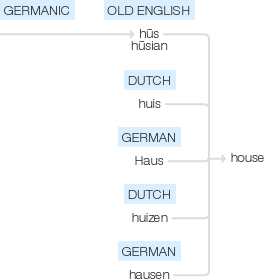House
Old English hūs (noun), hūsian (verb), of Germanic origin; related to Dutch huis, German Haus (nouns), and Dutch huizen, German hausen (verbs).
wiktionary
From Middle English hous, hus, from Old English hūs(“dwelling, shelter, house”), from Proto-Germanic *hūsą (compare Scots hoose, West Frisian hûs, Dutch huis, German Haus, German Low German Huus, Danish hus, Faroese hús, Icelandic hús, Norwegian Bokmål hus, Norwegian Nynorsk hus and Swedish hus), possibly from Proto-Indo-European *(s)kews-, from *(s)kewH-(“to cover, hide”). Compare also Northern Luri هۏش (höš, “house, home”). Eclipsed non-native Middle English meson, measoun(“house”), borrowed from Old French maison(“house”). More at hose.
The uncommon plural form housen is from Middle English husen, housen. (The Old English nominative plural was simply hūs.)
From Middle English housen, from Old English hūsian, from Proto-Germanic *hūsōną(“to house, live, dwell”), from the noun (see above). Compare Dutch huizen(“to live, dwell, reside”), German Low German husen(“to live, dwell, reside”), German hausen(“to live, dwell, reside”), Norwegian Nynorsk husa(“to house”), Faroese húsa(“to house”), Icelandic húsa(“to shelter, house”).
Probably from The Warehouse, a nightclub in Chicago, Illinois, USA, where the music became popular around 1985.
etymonline
house (n.)
Old English hus "dwelling, shelter, building designed to be used as a residence," from Proto-Germanic *hūsan (source also of Old Norse, Old Frisian hus, Dutch huis, German Haus), of unknown origin, perhaps connected to the root of hide (v.) [OED]. In Gothic only in gudhus "temple," literally "god-house;" the usual word for "house" in Gothic being according to OED razn.
Meaning "family, including ancestors and descendants, especially if noble" is from c. 1000. Zodiac sense is first attested late 14c. The legislative sense (1540s) is transferred from the building in which the body meets. Meaning "audience in a theater" is from 1660s (transferred from the theater itself, playhouse). Meaning "place of business" is 1580s. The specialized college and university sense (1530s) also applies to both buildings and students collectively, a double sense found earlier in reference to religious orders (late 14c.). As a dance club DJ music style, probably from the Warehouse, a Chicago nightclub where the style is said to have originated.
To play house is from 1871; as suggestive of "have sex, shack up," 1968. House arrest first attested 1936. House-painter is from 1680s. House-raising (n.) is from 1704. On the house "free" is from 1889. House and home have been alliteratively paired since c. 1200.
And the Prophet Isaiah the sonne of Amos came to him, and saide vnto him, Thus saith the Lord, Set thine house in order: for thou shalt die, and not liue. [II Kings xx.1, version of 1611]
house (v.)
"give shelter to," Old English husian "to take into a house; place or enclose in a house" (cognate with Old Frisian husa, German hausen, Dutch huizen); see house (n.). Intransitive sense from 1590s. Related: Housed; housing.
